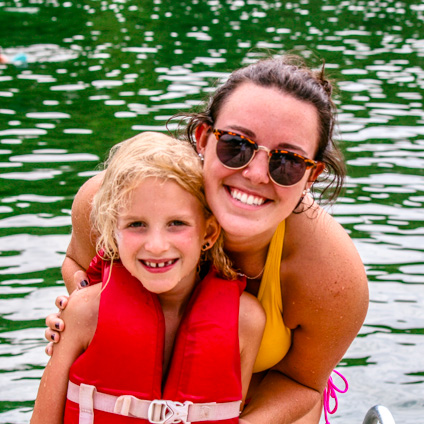Translating Camp: 21st Century Business Skills
What do you really do at camp? It’s not being a counselor; it’s leading and supervising a team of 12 enthusiastic individuals. It’s not running an activity; it’s implementing skill-based curriculum that’s tailored to the specific needs of the campers. You are an incredible counselor and can speak with intense passion about camp to our friends and families. However, we fail to adequately describe the camping experience and translate the skills we acquire to those who are not as well acquainted with the camping world. Hopefully, this resource helps. It’s a way to translate the skills you have acquired and the job requirements of working at a sleepaway camp to a business world when crafting resumes, cover letters and more.
 Counselor-skills gained:
Counselor-skills gained:
- Psychology of child development (helped children overcome challenges during specific fragile developmental periods)
- Emotional intelligence awareness and cultivation (cared for and understood children’s emotional needs)
- Living within a community—responsibility and awareness (brainstormed goals for each child and engaged them as a member of the community, taught respect for others and exemplified respect through consistency and compassion)
- Negotiation and consensus building (taught conflict resolution between friends and built morale between bunkmates)
- Teambuilding (led a series of superordinate goals that brought the group together and planned special events that encouraged friendship and collaboration)
- Group development, facilitation, and debriefing, both large and small group (facilitated thought-provoking discussions on a vast number of topics pertaining to teamwork, Judaism, and Israel)
- Program management (developed programs for children that kept them entertained and engaged)
- Working with emotional emergencies, angered/unbalanced people (helped children develop coping mechanisms when in high-risk situations or moments of emotional instability)
- Public speaking (conducted discussions with coworkers, children and the leadership staff ranging from numerous topics)
- Curriculum development (brainstormed programs and educational activities that were engaging and fun for children and staff, built the framework for educational programs for specific age groups)
- Emergency preparedness and risk management models, and execution (effectively learned and followed protocol for emergency procedures and took proper steps to ensure safety in high-risk environments)
- Innovation development principles, understood and practiced (collaborated with a team of eight staff members to develop creative strategies to handle situations and engage children in a diverse assortment of settings)
Living and working at Sabra requires:
- Flexibility (responding to quickly changing schedules and needs)
- Stamina (on the job 24/7, working in a physically demanding environment that requires the utmost care and attention)
- Communication skills to people of all ages and backgrounds (fellow staff, children, and parents, including those from other countries)
- Patience and compassion (working with children and staff)
- Conflict resolution (other staff as well as children)
- Ability to work in stressful situations (very tight schedule, high expectations, rapidly changing environment)
- Ability to react quickly and stay calm in high-stress environments (accidents/injuries, high-stress cabin group, emergencies)
- Ability to work with and relate to people of various ages (child-adult)
- Program and curriculum creation/development/evolution/assessment/improvement
As a counselor, you have been able to develop and hone your skills in seven key areas that can be seen throughout the job market:
- Leadership – modeled character and good behavior for campers including teamwork, listening, responsibility, initiative, and sportsmanship; motivated campers to develop new skills; supported campers in their efforts to try new activities and resolve conflicts.
- Management and Supervision – accepted 24-hour responsibility for managing daily activities of diverse group of twelve 10-year old campers; supervised personal interaction and skills development both on and off campus; assisted Leadership Staff with scheduling.
- Problem Solving and Conflict Resolution – practiced active listening and counseling skills by helping campers learn to live together; developed solutions for camper conflicts; taught campers how to work together to resolve problems themselves.
- Teamwork – cooperated with other counselors in my unit/area and within camp to create and implement group activities and special programs; taught teamwork to campers as a skill for group achievement.
- Program Development – created program to help campers manage cabin chores equitably on a daily basis; assisted Leadership Staff with special programs, educational activities, and event planning.
- Communication –wrote letters to parents to inform them of their children’s progress in camp, including positive and negative experiences and interactions; wrote reports for supervisors; interacted with peers, supervisors, administration, and campers.
- Evaluation – regularly observed and documented campers’ behavior and skills development and provided feedback to children as necessary; reported evaluations to supervisors accordingly.
When describing the skills you have acquired, use action verbs such as: initiated, led, engaged, planned, forecasted, identified, spearheaded, communicated, brainstormed, investigated, empathized, planned, organized, developed, etc.
Above all, tailor your resume and cover letter to the job in which you are applying. When going into the education sector, discuss the cultivation of a curriculum. When pursuing a job in business, highlight the teamwork, communication, and problem-solving elements of the position. For all positions, emphasize the collaboration, public speaking, and dedication that are required in being a counselor.

